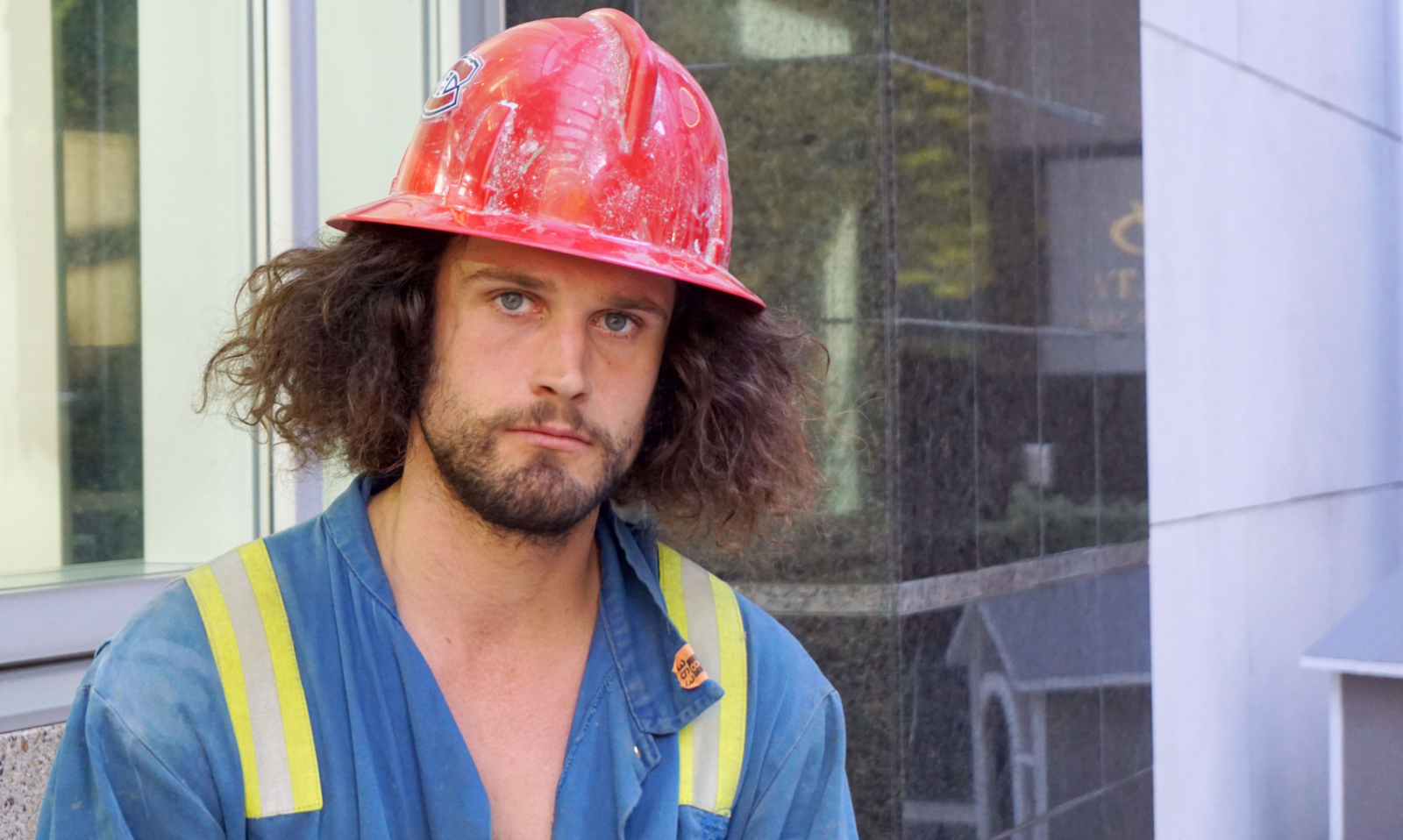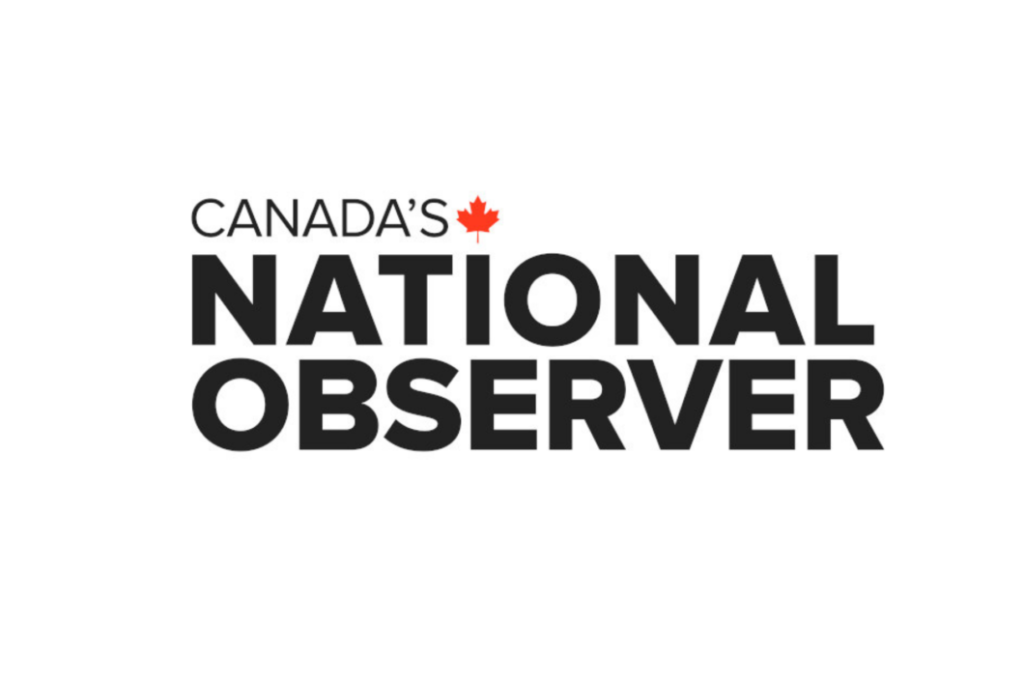Unpublished Opinions
National Observer is a new publication founded by Linda Solomon Wood and an award-winning team of journalists in response to the close relationship between the oil industry and media in Canada, and the urgency of climate change. National Observer focuses on news and in-depth reports on under-covered Canadian stories in the area of climate, energy, and related culture, business and politics. It was launched in May 2015 by Observer Media Group (OMG), which also owns Vancouver Observer.
Seed funding for National Observer came from a Kickstarter campaign, 'Reports from the Energy Battlegrounds' in February 2015. Since its inception in May 2015, National Observer has provided intensive, critical coverage of the oil industry, politics, corporate corruption, and much more.
We also highlight inspired business innovations and lifestyle hacks that build sustainability and resilience and help in the transition away from fossil fuels.
We provide our talented reporters days, weeks, sometimes even months, to do the investigative reporting that is vital to democracy.
For more information please visit our website at: http://www.nationalobserver.com
Post Media attacks former employee for being an investigative journalist

Mike De Souza spent 10 years working for Postmedia. Why are they attacking him now? Photo by Bea Vongdouangchanh.
I'm about to tell you…
- Why I’m under attack
-
Some things I’ve never disclosed before about my departure from Postmedia
- How you can help me fix what’s broken by subscribing to National Observer
National Post, a Postmedia publication, just published one of the most irresponsible pieces of journalism I have seen in over 15 years working in the business.
It was an attack on investigative journalism. It was an attack on the public's right to know, and on democracy.
It was an attempt to bully and intimidate investigative journalists out of doing their jobs. This is an attack on you and me and I think it's a public disgrace. Today, with National Observer, I pursue investigations about the issues that matter thanks to the support of readers like you.
It's like they wanted to crush me
Unfortunately, there are some who would rather not see this happen and they decided to attack me for doing my job.
I know that many of you care about jobs just as much as you care about taking action to address climate change.
Despite what some in the Canadian media might be trying to tell you, there is a substantial body of evidence out there that shows there is no contradiction between the two of these things.
For more than a decade, I have independently decided to investigate these issues, taking a detailed look at how the energy industry in Canada does business and how it interacts with government. I have done this with the support of different media outlets in Canada, including Postmedia News andNational Observer.
I have also decided, in my career as a journalist, that it's important to examine solutions to the challenges that we face as a society and write about these by including as many voices and opinions as possible in the conversation, anchored by facts and evidence.
Then there was this false and vicious article in the National Post that attacked both your values and mine.
What they didn't want you to know
The article focused on my investigations into the National Energy Board (NEB) and the Energy East pipeline hearings.
I exposed an apparent conflict of interest that led the NEB panel to recuse itself from participating in further hearings on Energy East, the largest crude oil pipeline ever proposed in Canada.
My investigation also led the chief executive of this independent regulator to admit that he appeared to be biased and should recuse himself from the process reviewing the project proposed by Calgary-based energy company, TransCanada Corp.
This has temporarily shut down the pipeline hearings.
I guess my ‘offence’ was letting you know what was going on behind closed doors between government officials and an agent for TransCanada, former Quebec premier Jean Charest.

Jean Charest portrayed on September 5, 2012, the day he announced his resignation at the Quebec legislature. File photo by The Canadian Press.
There are still many unanswered questions about what went on, and I continue investigating to get the complete picture.
But the attacks on me by the National Post indicate just how desperate some people are getting to put a stop to investigative journalism. They also demonstrate why it’s so important for you to support the National Observer and allow me to pursue this investigation and countless others.
They couldn’t attack the facts, so they attacked me
By coming forward today, I’m doing what needs to be done to defend journalism and our democracy from the people who believe that there are no lines to be drawn between government and industry.
The National Post’s story started by asserting that the Energy East hearings were suspended because of “anti-pipeline activism”.
The article then attacked a small source of funding that National Observer received in 2015. This was before I joined National Observer in January 2016.
It went down from there into a rabbit hole of conspiracy theories about sources of environmental funding across North America with no relation to journalism or National Observer.
The National Post got the facts wrong
I find it sad that I even have to write about this. As you may already know, there are a pile of secret documents on my desk that need to be brought to light and the time I spend on this is taking away from the time I need to spend on investigations.
The National Post article alleged that we were getting money from a U.S. foundation and that I declined to answer questions. These are irresponsible fabrications, apparently the figment of someone's imagination.
Here are the facts.
- National Observer received $21,000 in funding in 2015 from a U.S. foundation that is dedicated to making the world a better place.
- This funding was used to support general reporting that occurred before I joined National Observer in January 2016.
- There is no link between sources of funding and what I write.
- Most of our funding has come from people like you, people who subscribe or generously donate. We hope this can continue.
As you may know, my colleague, Linda Solomon Wood, is National Observer’s editor-in-chief.
She’s relentless in her dedication to finding support for public service journalism and keepingNational Observer’s reporting strong, even in this grim environment for media.
If you haven’t already, you can read Linda’s letter about how extremely difficult this can be. Our goal over the next 18 months is to become 100 per cent reader-funded through your ongoing subscriptions that can secure our independence for years.

Linda Solomon Wood, Editor-in-Chief, National Observer, photo by Tracy Giesz-Ramsay.
In the past, she has raised revenue from advertising and individual investors - in Canada and abroad.
Shameless self promotion alert: "National Observer was just nominated for 'Best News Site' in Canada, alongside CBC, Toronto Star and CTV, newsrooms with budgets thousands of times larger than ours!!!" We were also nominated in a category of media outlets with the best news coverage in Canada. My associate editor, Sandy Garossino, was also nominated for having the best column following an article she wrote about Postmedia's endorsement of former prime minister Stephen Harper in the last federal election.
But, you know, all media outlets must seek funding from a variety of sources. Postmedia is no different.
In fact, Postmedia has received hundreds of millions of dollars in funding or financing from American shareholders, American corporations and other foreign interests.
It is owned by an American hedge fund. National Observer reporter Bruce Livesey wrote about how this happened and the impact it has on Postmedia’s reporting here.
I was proud of my work with Postmedia
In my career as a journalist, I produced more than 1,000 articles for the National Post and other newspapers in the Postmedia chain.
And I know my reporting had a positive impact on Canada.
I focused in recent years on the secretive relationships between government and the oil industry. I exposed how millions of your tax dollars were being used to promote the development of the oilsands in advertising campaigns abroad. The reporting of these issues raised important questions about whether the federal government's policies at that time were actually helping the industry, or instead, doing serious damage to its reputation and its future.
I felt an enormous amount of pride in Postmedia during the eight years I worked there because this media outlet gave me the freedom to investigate many stories of public interest.
If you followed my work then, you may remember that I also uncovered how an oil company in Calgary was funding university “research accounts” used in a campaign to fool the public about climate change science. No other reporter chased the story and I received a citation of merit from the National Newspaper Awards for that investigation in 2012.

Mike De Souza received a citation of merit in April 2012 from the National Newspaper Awards for an investigation that uncovered how an oil company funded "research accounts" at the University of Calgary, used in a campaign to fool the public about climate change science
But it all came to an end one day in February, 2014 when a person from the Postmedia human resources department came into our Parliament Hill newsroom and informed me my position was being eliminated. On the same day, four other journalists in the Ottawa bureau also lost their jobs.
When it happened, many people asked me whether I was scared about my own future. But the reality was that this day left me feeling scared about the future of Canada.
And this is the part I’ve never talked about
I was lucky to find temporary work with the Toronto Star before taking another job at Reuters. But I was afraid that there was no Canadian media outlet with the resources to pursue the kind of investigative reporting I’d been doing in the long term.
I was scared that the backroom deals, secret strategy sessions and questionable use of Canadian taxpayers money would now have a free pass to proceed, without anyone to keep an eye on what was going on.
I worried about what was coming next for journalism, and for democracy.
Whatever I accomplish over the next few months, saving a life, changing a law, protecting a river, helping our economy, it will only be because of your support.
This has been a long article already, but please read on to see what you and I are up against
The Post article was written by researcher who attacked me over funding. I’m going to let you in on some details she didn’t disclose.
This researcher told me on Tuesday that she received $10,000 to attend a conference in Newfoundland and Labrador that was hosted in September by the Canadian Association of Petroleum Landmen.
This isn’t the only time that she’s accepted a contract or money from an oil and gas industry lobby group.
In fact, she’s admitted in recent years that her standard $10,000 fee for appearing at resource industry events is her primary source of income.
She has received tens of thousands of dollars worth of contracts from the Canadian Energy Pipeline Association, the Canadian Association of Petroleum Producers, the Inuvik Petroleum Show, Taseko Mines, and others.
This researcher claimed that I declined to answer her questions.
No comment from National Post
I had offered, in writing, to meet with her in person and answer her questions about our coverage. She declined. She even confirmed this to me when I spoke to her on Tuesday, contradicting herself several times in a short conversation.
“I didn’t (decline). Oh, why I declined to meet with you (was) because I wanted a straight answer. You’re the one who was beating around the bush. Not me.”
In what twisted world do researchers or journalists decline to meet a source because they think that this would prevent them from getting a “straight answer?"
In this case, the researcher told me that the contract she received from the petroleum landmen association was “arranged months ago” and “has nothing to do” with her article published in the National Post.
If she thinks people shouldn’t make connections between the funding she receives and what she writes, why does she feel it's important to write about funding for National Observer?
And here’s another point that should upset anyone with integrity: The researcher asked us questions, without disclosing that she planned to write an article for the Post - a blatant contravention of journalistic principles.
I raised these issues with the Comment Editor of the Financial Post — ultimately the person responsible for opinion pieces published by this newspaper — after reading the article. He hasn't responded.
If we were swimming in cash from foundations, National Observer wouldn’t be turning to you for subscriptions and donations to help us pursue our investigations.
We’ve met with a number of different people to seek new funding in recent weeks for our reporting – including with Canadian foundations. None of those meetings have produced anything and I can’t help wondering if the National Post’s article was meant to bully and intimidate anyone who wants to step forward to support us.
But here’s the thing, getting attacked by the National Post just makes me more determined to lead the team at National Observer to bring more critical stories and secrets of government to the public.
Fixing what’s broken in Canada
The National Post’s irresponsible attack is the exact opposite of my approach to journalism.
In its latest hatchet job, the National Post seeks to undermine your hope for a better future. When they attack National Observer, what they are really attacking is a reader like you.
Part of what I'm trying to do as Managing Editor that's different at National Observer is encouraging an open and constructive dialogue that allows all parties to participate.
I'm proud that my talented colleague, Elizabeth McSheffrey, recently wrote a moving piece about an oil industry worker, Bernard Hancock, who was struggling to find a job in tough times. And afterNational Observer published this piece for you to read, Bernard told rabble.ca that he got a call that led to him getting some temporary work.
These are the stories that matter and make a difference.

Oil patch worker Bernard Hancock, 32, received a call for a new job after he was featured in a National Observer report about his appearance at a federal pipeline panel in Vancouver, B.C. to help approve the Trans Mountain expansion on Thurs. Aug. 18, 2016. Photo by Elizabeth McSheffrey.
I reached out two weeks ago to Canada's main oil and gas industry lobby group, the Canadian Association of Petroleum Producers. I invited this lobby group to submit an opinion piece that offers their own perspective about what is happening to the country's energy industry.
I did this because I appreciate the complexity of the issues we face today and I believe it is important to respect the views of everyone with an open dialogue. As we continue in our lives to consume oil and other fossil fuels, we need to ask questions that are vital to Canada.
We need to find out what role our own energy industry can play in the future and help it find the information and support it needs to adapt to a changing global economy.
The solutions to our society's challenges won't come if we accept the messages of a few extremists running a national newspaper.
My preference is to pursue these stories in an inclusive way, engaging with Canada’s First Nations, energy companies, environmental groups, politicians, and readers like you.
And I want to know how you think Canada can gather in the middle ground and set our path toward solutions.
Back to those documents piling up on my desk...
Meantime, there are all these documents on my desk with stories that need to be told. Linda wrote to you about them here.
Some of these documents contain material that could help save lives, if only I could get the information out.
But I don't have the team or the resources to move forward on them.
So, please, subscribe to the National Observer, so I can continue to work on these important files.
Join me in the middle ground and let’s build a media organization that exists to serve you, its readers.



Comments
Be the first to comment